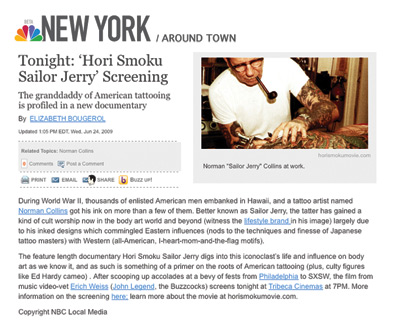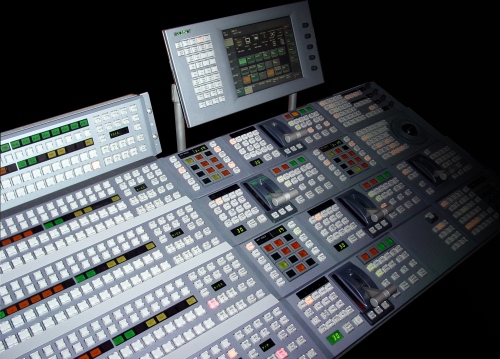
Jeff Zucker: Planning to Go Local With You or Without You?
Lukewarm is really never a good thing.
Not for soup, not for bathwater, and definitely not as an answer when someone’s asked to evaluate the earnings potential of the business you work in. And yet, for us, right now, that’s what we’ve got. The headline on televisionbroadcast.com: Analyst is Lukewarm on the Future of Local News.
Rich Greenfield of Pali Capital, a financial services firm that advises clients worldwide on markets and business sectors, thinks Local TV’s not as bad off as radio and newspapers, but it’s not quite healthy, either: “We believe the local TV business is in secular decline,” Greenfield writes on his blog. “While revenues/profits may bounce whenever the economy recovers, we have a hard time believing that local news, weather, traffic and sports at 7 a.m./5 p.m./ 6 p.m./11 p.m. can sustain viewership levels, and in turn, advertiser interest over the next several years.”
I’m not a financial analyst, Wall Street guru, or Financial Times subscriber. But I do know this: if your advertiser-supported business cannot “sustain advertiser interest,” you have a serious problem. And, as I’ve been arguing here, I believe Local TV has an Everything-Must-Change problem. The thing is, I don’t sense that most companies that own television stations have much interest in changing.
Or maybe they simply don’t know how to change. The problem is, other companies are already working on that, and they will not share the fruits of their efforts with local stations when their new model becomes profitable. And NBC may be one of those companies. (Don’t feel relieved just yet, NBC affiliates, you might not be invited to the peacock’s party–in your own town)
Here’s NBC’s affiliate relations chief, John Eck, talking last month to TVNewsday about building deeper, stronger ties between the network and its affiliates: “We invited all affiliates — whether our agreement is expiring this year or several years down the road — to talk about how we could modify the existing arrangements so that we could participate on more platforms together.”

The Bird: Bullish on Local, Just Not Necessarily Local Stations
And then there was the big, bold, rah-rah smack on the affiliates’ lips from NBCU CEO Jeff Zucker at the NBC affiliates’ meeting in May, as quoted by Broadcasting & Cable: “Let me set the record straight once and for all,” said Zucker. “Standing here on the stage of one of the most famous broadcast studios in the world–created for radio, rebuilt over the years for television, then color TV, then digital broadcasting–let me be as clear as I can be: We are not abandoning the business of broadcast network television. We are not going direct to cable. We are renewing affiliation agreements. And we are going to be in business together for a long, long time.”
A long, long time, eh? I guess it depends on what your definition of being in “business together” means. To NBC, it means getting a taste of affiliates cable and satellite retransmission deals, and in exchange, affiliates get a piece of NBC’s local online news and entertainment businesses.
Uh, did you say NBC’s local online businesses?
Oh yeah, you didn’t hear? The peacock’s got big plans for local media, whether they own stations in local markets or not. For NBC affiliates, the network’s offering a “gold” package, wherein the station and NBC cooperate on a local website, among other platforms, in exchange for a renewed and reinvigorated relationship in this troubled times. “We’d be willing to go long, long for a gold package,” John Eck told TVNewsday. What if stations don’t want to share the local web pie? “Your affiliation arrangement is going to be much shorter term,” said Eck.
NBC station owners and managers have obvious reservations about the NBC offer. NBC Affiliates Board Chair Mike Fiorile (COO of Dispatch Broadcast Group) talked about the “gold” plan with TVNewsday’s Harry Jessell:
“Do you want to be partners with NBC on local Web sites? For instance, they would want you to be NBCindianapolis.com.
Frankly, I don’t have a lot of interest in that. I’m already NBC Indianapolis. If someone does a search for NBC Indianapolis, I’d sooner they come to a site that I own as opposed to a site that I’m a partner with somebody else on.
Well, this could be a second site for you because NBC is proposing lifestyle sites as opposed to the news site you’re now doing.
Yes, but I’d rather have all the NBC Indianapolis traffic come to visit me.”

We're NBC in This Town, Thanks Very Much
All well and good. It’s completely understandable that the guy whose station, WTHR, has historically been NBC in Indianapolis, would like his website to be the source for news and information and all things Indy and NBC.
Well, here’s the interesting thing about NBCIndianapolis. It already exists, and WTHR doesn’t own it. GE does. In fact, a quick survey of URL listings reveals that in market after market, NBC’s been on a domain-buying spree in cities where there are no NBC O&Os.
In Boston, where Sunbeam’s NBC station, WHDH has had a bumpy partnership with the network–most recently threatening not to air Jay Leno’s new primetime show–NBC’s ready to roll into the market with or without Ed Ansin. NBCBoston.com is owned by GE. Whether WHDH considers the domain simply a placeholder purchased by a network just in case station and affiliate ever wanted to team up on a site, or rather a threat to compete directly with WHDH’s whdh.com for local clicks–and dollars–is not something the station wanted to talk about. “We are aware of NBC local,” WHDH’s Chris Weyland said in an email. “We have no comment.”
Perhaps NBC’s just thinking ahead and buying up domains before some joker can get to them first, and has no plans for using NBCBoston.com to compete against its own NBC station. But keep this in mind: NBC’s business model has already moved beyond call letters.

NBCNewYork: Peacock Yes, Station Call Letters No
Jeff Zucker explained his thinking clearly in a quote on lostremote: “WNBC.com or WNBC4.com is an extension of the television station, it’s not a real scaled game. We don’t want to play just in that game. We want to play in the entire New York or Chicago or Los Angeles or whatever city you want to call it online media space and we can’t do that by just limiting ourselves to the call letters of our traditional analog TV station.”
“Or whatever city you want to call it.” If you work at an NBC affiliate, punch in NBC and your city. Is the domain taken? Is that why NBC’s smiling even as the over-the-air business for stations fades away?
I’m just asking. NBC, by the way, did not respond to requests for comment.

 I can’t operate a switcher to save my life. In fact, in all the years I’ve been in and around control rooms, they’ve never failed to give me the creeps (the low light and monitors, glowing buttons and standys and takes and, of course, all that shouting) I’ve always been far more comfortable out in the middle of a hurricane or elbowing my way into the pack to get my mic in front of some indicted public official.
I can’t operate a switcher to save my life. In fact, in all the years I’ve been in and around control rooms, they’ve never failed to give me the creeps (the low light and monitors, glowing buttons and standys and takes and, of course, all that shouting) I’ve always been far more comfortable out in the middle of a hurricane or elbowing my way into the pack to get my mic in front of some indicted public official.









